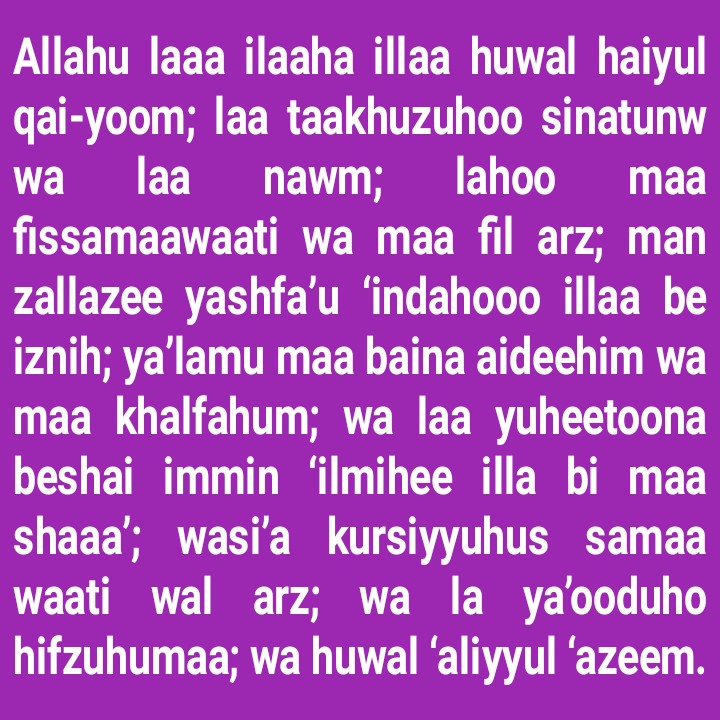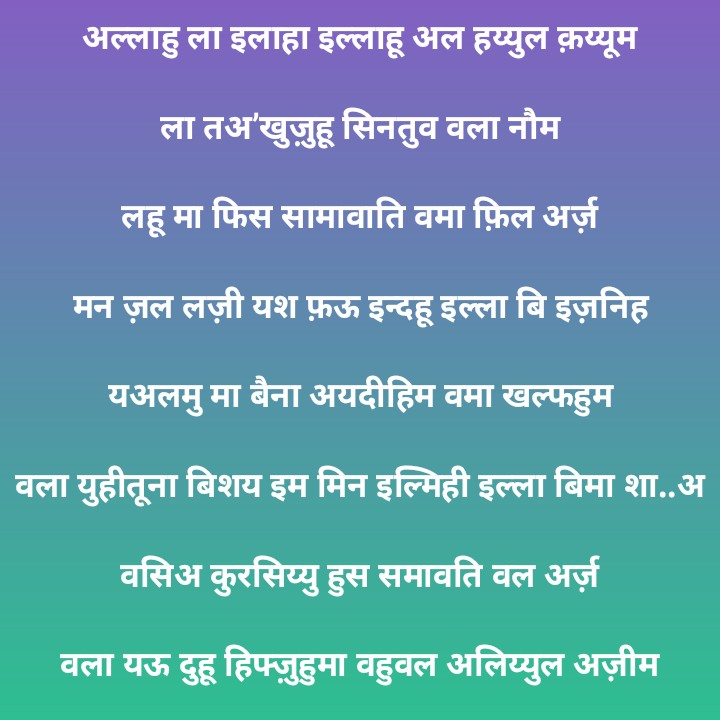Ayatul Kursi, often referred to as the “Throne Verse,” is a profound and highly revered verse found in the Quran, the holy book of Islam. Its importance transcends linguistic and cultural boundaries, making it one of the most cherished and recited passages in the Muslim world. In this introduction, we will delve into the essence of Ayat al Kursi, exploring its origins, theological significance, and the reasons behind its special place in the hearts of millions of believers.



Ayat ul Kursi is situated in the heart of the Quran, within Surah Al-Baqarah (The Cow), precisely in verse 255. This divine passage is known for its eloquence, depth of meaning, and the powerful attributes of Allah that it conveys. Its impact is not limited to recitation but extends to guiding believers in their understanding of God’s sovereignty, His omnipotence, and His role in the universe.
Also read: Dua for Safar
This blog will serve as a comprehensive exploration of Ayat ul-Kursi, shedding light on its history, belief, virtues, and practical applications in the lives of Muslims. We will also address common misconceptions and provide insights into its memorization and recitation. Ultimately, our aim is to deepen your understanding of Ayatul Kursi and its significance in the world of Islam, offering readers a comprehensive view of this revered verse.
Historical Background Ayatul Kursi
Ayat ul Kursi, the 255th verse of Surah Al-Baqarah in the Quran, is a timeless and spiritually significant passage with deep historical roots in the Islamic tradition. Understanding its historical background provides valuable context for appreciating its significance. Here are some key aspects of its historical background:
1. Revelation in Medina: Ayat al Kursi was revealed to the Prophet Muhammad (peace be upon him) in the city of Medina during his prophetic mission. It is situated within Surah Al-Baqarah, one of the longest chapters in the Quran, and was revealed at various times during the Prophet’s stay in Medina.
2. Spiritual and Theological Significance: The historical context of Ayatul Kursi is closely linked to the development of Islamic theology. It emphasizes the oneness (Tawheed) and the absolute sovereignty of Allah. The verse underscores Allah’s attributes, such as being the Ever-Living and the Sustainer of existence, and His knowledge of all that exists.
3. Role in Quranic Exegesis (Tafsir): Islamic scholars and commentators (mufassirun) have provided extensive explanations and interpretations of Ayat al-Kursi throughout history. Their interpretations have played a crucial role in shaping the understanding of this verse.
4. Interactions with Other Communities: During the time of the Prophet Muhammad, there were interactions with various Jewish and Christian communities in Medina. Ayat ul Kursi emphasis on monotheism and God’s attributes may have had a profound impact on these dialogues and discussions.
5. Protection and Blessings: The historical background also includes stories and traditions of the Prophet Muhammad emphasizing the protective and spiritually beneficial aspects of Ayatul Kursi. It has been a source of comfort and strength for believers throughout history.
Understanding the historical context of Ayat al-Kursi deepens one’s appreciation of its theological and spiritual significance. This verse has been a beacon of faith for Muslims over the centuries, offering a profound understanding of God’s attributes and reinforcing the core beliefs of Islam.
Theology and Belief
Ayat ul Kursi is a verse from the Quran, specifically from Surah Al-Baqarah (2:255). It is a highly revered and significant verse in Islamic theology and belief. Here are some key aspects of its theology and belief:
1. Monotheism (Tawhid): Ayat ul Kursi emphasizes the oneness of God (Allah). It describes Allah as the only deity, the Ever-Living, the Sustainer of the universe. This reinforces the fundamental Islamic belief in the absolute monotheism of Allah.
2. Infinite Knowledge and Power: The verse highlights Allah’s knowledge and power over the entire creation. It mentions that Allah has knowledge of everything in the heavens and the earth. This underscores the idea that Allah’s knowledge and power are limitless.
3. Sovereignty: Ayatul Kursi affirms Allah’s sovereignty over the universe. It asserts that all things belong to Allah, and He maintains control over them. This concept is central to Islamic theology.
4. Protection and Guardianship: Many Muslims believe that reciting Ayat ul Kursi provides protection and guardianship. It is often recited for spiritual and physical protection, especially before going to sleep.
5. Supplication and Connection: Believers often turn to this verse in moments of supplication and connection with Allah. It is considered a means to seek Allah’s blessings, guidance, and forgiveness.
6. Recitation in Prayer: Ayatul Kursi is sometimes recited during Islamic prayers (Salat) and is particularly recommended in the Sunnah. It is believed to enhance the spiritual connection with Allah during worship.
Overall, Ayat ul-Kursi is a fundamental element of Islamic theology and belief, emphasizing the attributes of Allah, His sovereignty, and the importance of monotheism in Islam. Many Muslims hold it in high regard and incorporate it into their daily spiritual practices.
Recitation and Memorization
Reciting and memorizing Ayat al-Kursi is a noble and rewarding practice in Islam. Here’s a guide on how to do so:
Recitation of Ayatul Kursi
1. Understand the Meaning: Before you start reciting, it’s important to understand the meaning of Ayat al-Kursi. This will help you connect with the words and their significance.
2. Choose a Quiet and Clean Place: Find a peaceful and clean place for recitation, free from distractions.
3. Begin with Wudu: It’s recommended to perform ablution (wudu) before reciting any Quranic verses.
4. Start with Bismillah: Begin by saying “Bismillah” (In the name of Allah, the Most Gracious, the Most Merciful).
5. Recite Slowly and Clearly: Recite Ayatul Kursi slowly and with clarity. Pay attention to correct pronunciation.
6. Repeat as Needed: You can recite it as many times as you like, but at least once during your daily routine.
Memorization of Ayat al-Kursi
1. Listen and Repeat: Start by listening to a qualified Quranic reciter recite Ayat ul-Kursi. Repeat after them to familiarize yourself with the pronunciation and melody.
2. Break it into Sections: Divide the verse into smaller sections to make memorization easier. Begin with the first few words or phrases.
3. Repeat Regularly: Consistent repetition is key to memorization. Recite the verse from memory regularly to reinforce your learning.
4. Use Visualization: Try to visualize the words and their placement within the verse. This can help with recall.
5. Understand the Meaning: Understanding the meaning of the verse can aid in memorization because it provides context.
6. Seek Help from Others: If possible, seek assistance from a knowledgeable person, such as a Quran teacher, to correct your recitation and help with memorization.
7. Patience and Persistence: Memorizing Ayatul Kursi may take time, so be patient and persistent. It’s a noble effort that brings spiritual rewards.
Remember, the process of memorization and recitation should be done with sincerity and devotion. Ayat ul-Kursi is a powerful verse with significant spiritual benefits, and your efforts to engage with it will be rewarded.
Practical Applications
Ayat ul Kursi has several practical applications in a Muslim’s daily life. Here are some ways in which this Quranic verse can be applied:
1. Seeking Protection: Ayat ul-Kursi is renowned for its protective qualities. Muslims recite it before going to sleep, when entering their homes, and when facing challenging situations. It serves as a spiritual shield against harm.
2. Strengthening Faith: Regularly reciting Ayatul Kursi can help strengthen one’s faith. It reminds believers of the greatness and majesty of Allah, deepening their connection to Him.
3. Understanding the Attributes of Allah: The verse highlights the attributes of Allah, such as His knowledge, power, and authority. Meditating on these attributes can lead to a better understanding of Allah’s nature and His role in one’s life.
4. Guidance in Decision-Making: When faced with important decisions or dilemmas, Muslims may recite the verse to seek Allah’s guidance. It can help in making choices that align with their faith and values.
5. Overcoming Fear and Anxiety: In times of fear or anxiety, reciting Ayat ul Kursi can bring comfort and assurance. Believers find solace in the knowledge that Allah is the ultimate protector.
6. Seeking Forgiveness: Ayatul Kursi can be recited in moments of repentance and seeking Allah’s forgiveness. It serves as a reminder of Allah’s mercy and the importance of turning to Him in times of wrongdoing.
7. Establishing Connection in Daily Routine: Incorporating the recitation of Ayat al-Kursi into one’s daily routine helps maintain a constant connection with Allah. It can be recited after obligatory prayers or at any time during the day.
8. Teaching and Passing Down to Others: Parents often teach their children Ayat ul-Kursi from a young age. Sharing its importance and teachings with the next generation helps instill a strong faith foundation.
9. Soothing and Healing: Some Muslims believe that reciting Ayat ul Kursi can have a soothing and healing effect, both spiritually and physically, when faced with illness or discomfort.
10. Dhikr and Meditation: Ayatul Kursi can be a form of dhikr (remembrance of Allah) and meditation. Reciting it with focus and contemplation allows individuals to immerse themselves in the verse’s spiritual meaning.
It’s important to remember that the practical applications of Ayatul Kursi go beyond the mechanical recitation. The key is to recite it with sincerity, understanding, and a genuine connection to Allah, using it as a means to seek His guidance, protection, and blessings in various aspects of life.
Conclusion
In conclusion, Ayatul Kursi holds a special place in the hearts of Muslims, offering profound spiritual significance and practical applications in their daily lives. This single verse from the Quran, found in Surah Al-Baqarah (Chapter 2, Verse 255), encapsulates the essence of Allah’s greatness and majesty.
Ayat al Kursi is not just a set of words to be recited mechanically, but a means to connect with the Divine and seek His protection, guidance, and blessings. Its practical applications extend to various facets of a believer’s life, including seeking protection, strengthening faith, making decisions, understanding Allah’s attributes, and finding solace in times of fear or anxiety.
Furthermore, Ayat ul Kursi serves as a reminder of the importance of seeking forgiveness and maintaining a constant connection with Allah. It is a verse to be recited with sincerity, understanding, and contemplation.
In essence, Ayatul Kursi is a source of spiritual enrichment and a reminder of the core beliefs in Islam. Its significance goes beyond the physical act of recitation, impacting the hearts and minds of those who turn to it in devotion and faith. It stands as a timeless testament to the greatness and majesty of Allah, the Most High.
